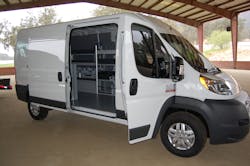“Efficiency” is becoming a far more critical – and far more encompassing – watchword in the full-size commercial van segment now and in the future; not just as it applies to fuel economy anymore.
According to Mark Mallie, head of commercial product planning for Chrysler’s Ram Trucks division, “efficiency” is driving improvements to vans ranging from enlarged cargo carrying capacity, lower step-in heights, and improved cab functionality to more engine options for boosting both fuel economy and overall van performance.
“We surveyed our van customers and found that while fuel economy ranks number one on the list of their demands in the small cargo van segment, it’s only ranked fourth in the full-size segment,” he explained to Fleet Owner during a Ram Truck ride and drive event held outside Thousand Oaks, CA, this past week.
“It’s not that they don’t want better fuel economy; they want greater efficiency first,” he stressed. “For example, they want a wider cargo area not only so delivery operators can load in palletized cargo between the wheel wells, but also to provide a wider ‘center aisle’ when the van is set up with shelving in order to improve interior working space.”
That’s one reason why Ram’s ProMaster body is shaped in what Mallie calls a “shoe box” style; it allows the OEM to maximize both the height and width of the van’s interior to create greater and more efficient interior space for the vehicle.
Ram is also in the process of rolling out a 3-liter inline I-4 four-cylinder diesel engine option for its ProMaster van to complement its standard 3.6-liter Pentastar V6 gasoline power plant; options designed, again, to provide greater efficiency to van operators depending on their duty cycle, said Mallie.
“If a van operator is driving a lot of highway miles across wide open spaces, the diesel will be a better fit; it’ll cost around $4,000 more for the diesel option, but with its better fuel economy, the operator should be able to make it up in three years if they run it a lot,” he explained.
That being said, Mallie believes the “split” between customers selecting gasoline versus diesel engines for the ProMaster should run about 80% to 20%. “East Coast buyers especially favor the gasoline options; it finds their operating patterns better,” he noted.
Mallie also thinks that expanded options being offered with the ProMaster van – such as choice of roof heights, wheel bases, engines, etc. – will be critical to winning more business as replacement demand for light vehicles, especially in the van segment, continues to climb.
“The average age of vans is now up around 12 years, whereas among the general population of light vehicles it’s around 11.5 years – that says to us there will continue to be a lot of replacement demand,” he pointed out.
“The key for us is to provide those van buyers with the ability to improve their operations with a new vehicle no matter what calculations they rely upon – be it better fuel economy, better TCO [total cost of ownership], better vehicle options, whatever,” Mallie emphasized. “The van is a tool and it’s supposed to save the owner and operator both time and money. That’s why there’s such a greater focus on efficiency now.”
About the Author
Sean Kilcarr
Editor in Chief
Sean Kilcarr is a former longtime FleetOwner senior editor who wrote for the publication from 2000 to 2018. He served as editor-in-chief from 2017 to 2018.
